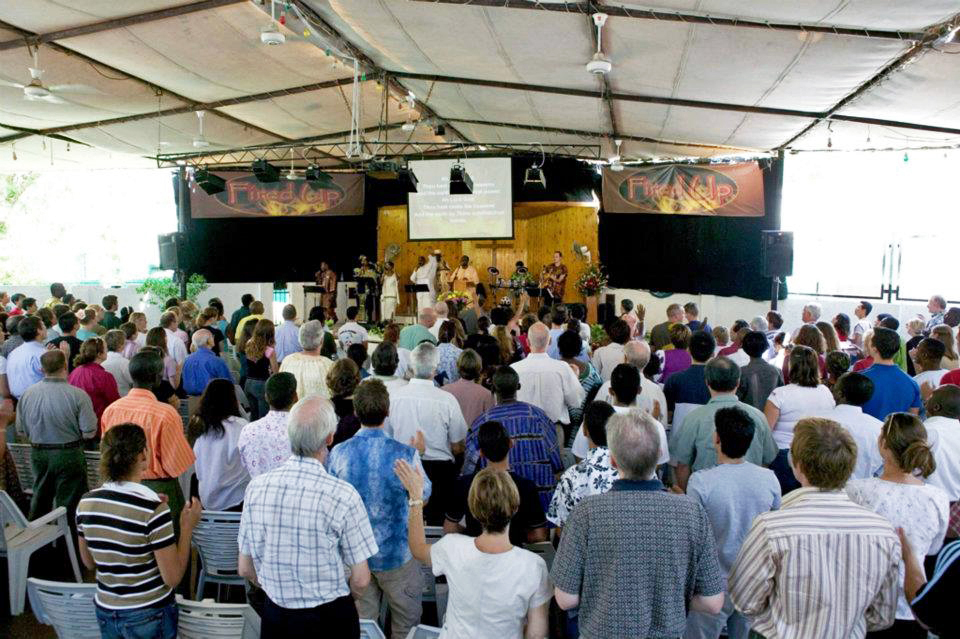As a theologian professionally training pastors for the past sixteen years, it is always a blessing when you personally discover something new that helps you understand Jesus more fully. As a pastor leading God’s people in worship every week, it is a welcome surprise to learn a new way of presenting the Gospel that helps regular Christians, in all their diversity, press into a deeper spiritual life.
In this past year since joining The Christian and Missionary Alliance, it has been refreshing to learn at the feet of A.B. Simpson and meditate on what his central insight of the fourfold Gospel means in our contemporary setting. Last autumn, with my wife, Maegan, and a team of gifted leaders, I stepped out in faith to begin with New Ventures in the Halton-Hamilton Region of Ontario. I did not realize the ways in which joining the Alliance would strengthen both my philosophical theology and my practical ministry.
I grew up in the church, and have studied in numerous denomination contexts, but was still taken by surprise by the beautiful simplicity of seeing Jesus as Saviour, Healer, Sanctifier, and Coming King.
In the modern context, in a cosmopolitan area like the Greater Toronto Area, the Church needs to rethink how to present Jesus as Saviour. When the word “sin” has little punch amongst the populace, it is incumbent upon us to answer the question, “save us from what?” Thankfully, our culture has at the same time become aware of just how “broken” we are. The more the news programs put a spotlight on mental health, cancer, bullying, poverty, social injustice, and addictions, the more obvious the need for a Saviour becomes. Of course, sin is the root of each of these manifestations, but the Church simply needs to highlight the brokenness before us, and the allure of our Saviour grows greater. As politicians continue losing the trust of the populace, pointing at Jesus as the only one to save us from this mess, starts to actually seem realistic.
I will be honest, Jesus as Healer, is something that I always knew to be true, but grew uncomfortable with as certain televangelists started to make the church a laughing stock. Simpson’s unapologetic emphasis on healing, taking the instructions of the Apostle James seriously, reminds me that our God is greater than our human limitations in either ability or imagination. As a new venture, we prayed over one of our leaders during an early service and saw his pain go away. Other instances followed. And then my ministry partner, Darin Martin, went to Columbia and came back flabbergasted at the supernatural healing he encountered right before his eyes. Our people are awakening to the healing power available in Jesus’ name. Although abuses do occur, the reality is that Jesus does heal, and we need to anoint our sick with oil and faithful prayer. There is a danger of thinking we can arm wrestle God into doing our bidding, there is a greater danger of missing out on divine healing because we were too ashamed or afraid to ask. Jesus is the only One who can heal our cities from sickness and addiction.
Personally, the Gospel reality of Jesus as Sanctifier has been the greatest insight I have gleaned from Simpson. In my years of ministry to a largely young adult church in downtown Toronto, our motto for a time was “reverence for an irreverent generation.” I learned that what best attracts millennials to Christ is actually reverence, not relevance. When you come to face to face with Holiness in the life of a real individual who allows Christ to their life, the power is undeniable. Yet the reminder of our Sanctifier in Alliance teaching has affected me deeply and made it more real. As I spent time away in retreat as part of the ordination process, the Spirit kept impressing upon me to call our people to a deeper life. When we allow Christ to live His life through us, a life of holiness brings power as we speak truth into our dark world. People are drawn to those whose lives reflect the perfection of Jesus within them. The church has been languishing in mediocrity, it is only as we dig further into sanctification that any power will return to our evangelizing.
Finally, A. B. Simpson emphasized the premillennial return of Jesus as Coming King to a degree that makes most contemporary Christians blush. Growing up in a tradition where eschatology became a dividing line that separated rather than encouraged, it was easy to downplay talk of the end times. Yet similar to the doctrine of Christ’s healing power, I have come to conclude that the current generation has thrown the baby out with the bathwater. Without a healthy dose of expecting Christ to return in our preaching, it is easy to put our hope in technology, extra-biblical ideologies, or to lose hope altogether. When the Church embraces the imminent return of Christ, Simpson is right, we are empowered for mission and look beyond the walls of our buildings. He also asserted it causes us to pursue unity among ourselves as we do not want to be caught pointing our fingers at our brothers and sisters we could not get along with. As surely as Jesus ascended into the sky, He will return, and we want to be ready to catch that first glimpse.
Imagine my shock upon realizing how powerful this simple articulation of a fourfold gospel is for the modern Church. I have read many books, attended many conferences, and yet the Spirit was stirring in me in ways I had not felt for years. As much as each of these individual snapshots of Jesus impacted me on their own, it was in their united presentation that I saw a supernatural power for transformation. As a professor teaching the course Doctrine of Christ, I have come to know just how each generation’s image of Jesus affected not only their theology but also their ministry, both in discipling and in missional outreach. We tend to become fixated on one aspect or another of Jesus depending on our time in history. Rather than letting our cultural context overly determine how we see Christ (there is no escaping some influence), when we hold before us a unified picture of Jesus in His fourfold ministry, it allows us to influence our culture with the presence of Christ incarnate through our lives.
Share:
Find more posts about:
cyril.guerette
Support the mission
The Global Advance Fund (GAF) is a pooled fund that supports our workers in Canada and around the world to share the Gospel with people who haven't yet heard the name of Jesus. Your continued generosity equips and sustains our workers and their ministry.








